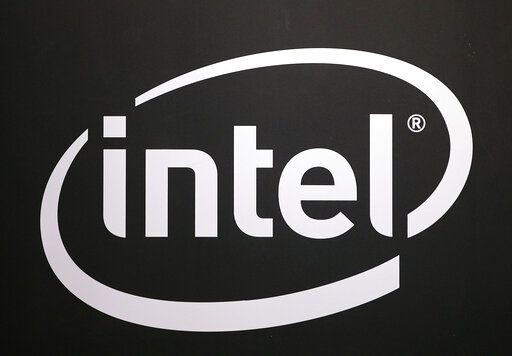Intel unveils $88B chipmaking expansion plan for Europe
The logo of semiconductor chip maker Intel is pictured at the Paris games week in Paris, Nov. 4, 2017. The U.S. chipmaker unveiled plans on Tuesday, March 15, 2022 to invest up to $88 billion across Europe as part of an ambitious expansion aimed at evening out imbalances in the global semiconductor supply chain. Intel is in talks with Italy for a back-end manufacturing facility. There are also plans to expand in France, Poland and Spain. (AP Photo/Christophe Ena)
LONDON (AP) — U.S. chipmaker unveiled plans on Tuesday to invest up to 80 billion euros ($88 billion) across Europe as part of an ambitious expansion aimed at evening out imbalances in the global semiconductor supply chain.
CEO Pat Gelsinger said Intel was investing the money “along the entire semiconductor value chain” as part of a holistic global strategy. Intel said it’s bringing its most advanced technology to Europe to address the need for a “more balanced and resilient” semiconductor supply chain.
European Union leaders last month announced a “Chips Act” to help the continent become a major semiconductor producer and curb its dependency on Asian markets for the tiny components, which act as the electronic brains for everything from cars to smartphones and game consoles.
Santa Clara, California-based Intel’s investment plans include 17 billion euros to beef up its European production capacity with a leading-edge semiconductor fab “mega-site” in Magdeburg, Germany that is expected to come online by 2027 and create 3,000 high tech jobs.
The plans also call for 12 billion more euros of additional investment to expand Intel’s existing site in Leixlip, Ireland, by doubling manufacturing space and expanding foundry services.
Intel says it’s also in talks with Italy “to enable a state-of-the-art back-end manufacturing facility” that would involve potential investment of up to 4.5 billion euros and create thousands of direct and indirect jobs.
There are also plans for a research and development hub and a design center in France, expanded lab space in Poland and an advanced computing lab in Spain.
“Why are we doing this? Because the world has an insatiable demand for semiconductors, or chips,” Gelsinger said in a webcast.
In the same webcast, European Commission President Ursula von der Leyen hailed the announcement as the first major achievement under the EU Chips Act.
“I’m sure it will pave the way for more companies to follow suit,” said von der Leyen, who wants the EU to double its share of global chip production to 20% by 2030.
Copyright 2022 The Associated Press. All rights reserved.


